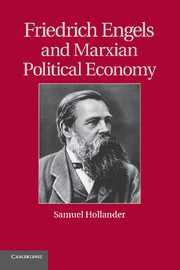Book contents
- Frontmatter
- Contents
- Preface
- Prolegomena
- 1 Engels's Early Contribution
- 2 The Surplus-Value Doctrine, Rodbertus's Charge of Plagiarism, and the Transformation
- 3 Economic Organization, and the Price Mechanism
- 4 “Revisionism” I. Constitutional Reform versus Revolution
- 5 “Revisionism” II. Social Reform
- 6 The Engels–Marx Relation
- 7 A Methodological Overview
- Epilogue: The Immediate Legacy
- Appendix A Prolegomena: A Brief Chronology
- Appendix B Chapter 5
- Appendix C Chapter 7
- Bibliography of Works Cited
- Index
- Titles in the series
Appendix A - Prolegomena: A Brief Chronology
Published online by Cambridge University Press: 01 June 2011
- Frontmatter
- Contents
- Preface
- Prolegomena
- 1 Engels's Early Contribution
- 2 The Surplus-Value Doctrine, Rodbertus's Charge of Plagiarism, and the Transformation
- 3 Economic Organization, and the Price Mechanism
- 4 “Revisionism” I. Constitutional Reform versus Revolution
- 5 “Revisionism” II. Social Reform
- 6 The Engels–Marx Relation
- 7 A Methodological Overview
- Epilogue: The Immediate Legacy
- Appendix A Prolegomena: A Brief Chronology
- Appendix B Chapter 5
- Appendix C Chapter 7
- Bibliography of Works Cited
- Index
- Titles in the series
Summary
28 November 1820: FE born at Barmen-Elberfeld, Prussian province of the Rhineland.
August 1838–March 1841: Business training in Bremen.
September 1841–October 1842: Voluntary military service in Berlin; joins group of Young Hegelians (“The Free”).
November 1842: Meets with KM in Cologne office of the Rheinische Zeitung.
December 1842–August 1844: Commercial training at “Ermen & Engels” in Manchester; meets Mary Burns – his companion from Summer 1845.
October–November 1843: Composes the Outlines of a Critique of Political Economy.
November 1843: First mentions KM in print, in the New Moral World newspaper.
February 1844: His Outlines published by KM in Deutsch-Französiche Jahrbücher (first and only number of the journal).
Late August–early September 1844: Second meeting with KM, in Paris; beginning of Marx–Engels collaboration.
September 1844: Returns to Barmen.
September 1844–March 1845: Composes The Condition of the Working Class in England.
April 1845: Joins KM in Brussels (until 1848).
July–August 1845: Visits Manchester with KM.
January 1846: FE and KM found the Communist Correspondence Committee (Brussels).
January 1847: FE and KM invited to join the “League of the Just” (a communist group organized in 1836–8) in Paris.
June 1847: The League reorganized as the League of Communists; London Congress adopts FE's “Draft of a Communist Confession of Faith” as provisional basis of its new program.
December 1847: FE's Principles of Communism accepted as basis of final version of the program; KM asked by Communist League to prepare document for publication.
- Type
- Chapter
- Information
- Friedrich Engels and Marxian Political Economy , pp. 357 - 358Publisher: Cambridge University PressPrint publication year: 2011



